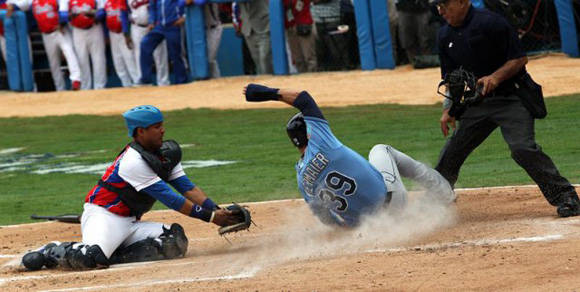
MLB, Cuban Baseball Federation reach agreement; Trump administration may block it
Major League Baseball on Wednesday reached a historic agreement with Cuba’s baseball federation, modeled after those with leagues in Japan and Korea, that would regulate and streamline the entry of Cuban players coming to the U.S., the league announced. But it remains to be seen whether the Trump administration’s harder line against the Cuban government leaves room for the agreement to work in practice.
The agreement, the result of years of negotiations between MLB, the MLB Players Association and the Cuban Baseball Federation (FCB), is designed to end decades of fraught relations between MLB and Cuba and eliminate the need for Cuban players to defect. The new system wouldn’t change how Cuban players are compensated by MLB teams, but would result in “release” fees being paid to the FCB for those players’ services.
However, the Trump administration has signaled it has problems with a business relationship in which the Cuban government profits from a U.S. company.
The agreement “would institutionalize a system by which a Cuban body garnishes the wages of hard-working athletes who simply seek to live and compete in a free society,” a senior administration official said Wednesday night, several hours after MLB’s announcement. “… Parties seeking to benefit from business opportunities in Cuba are on notice that the Administration will continue to take actions to support human rights and restrict the Cuban regime’s ability to profit from U.S. business.”
In 2016, under the Obama administration, MLB obtained a license from the Office of Foreign Assets Control (OFAC) of the Treasury Department to enter into a business arrangement with the FCB much like the one outlined in Wednesday’s agreement, according to two MLB officials. League officials were in frequent contact with the Trump administration in the weeks and months leading up to Wednesday’s announcement, and confirmed with OFAC that the license was still valid. Despite the administration’s pushback, the league believes the humanitarian benefits of the new agreement were worth moving forward.
Under the new agreement, Cuban players would be signed out of Cuba and, subject to U.S. government approval, granted a work visa. However, a State Department spokesman said that players will have to travel to a third country to apply for a visa, like other Cuban nationals, per current U.S. policy.
[…]
Under the terms of the new agreement, Cuban players can still elect to leave the island, establish residency elsewhere and join MLB, but they would be subject to a waiting period of as long as two years, and the MLB team that signs him would still have to pay a release fee to his former Cuban club.
[…]
Rep. Mario Diaz-Balart (R-Fla.), a vocal critic of the U.S. government’s more open policy toward Cuba, blasted the agreement in a tweet Wednesday, equating the movement of Cuban players to the U.S. with human trafficking and saying it was “shameful” that MLB “would consider joining with the Cuban regime to exploit Cuban baseball players.”
To read the complete story in The Washington Post, click here.

